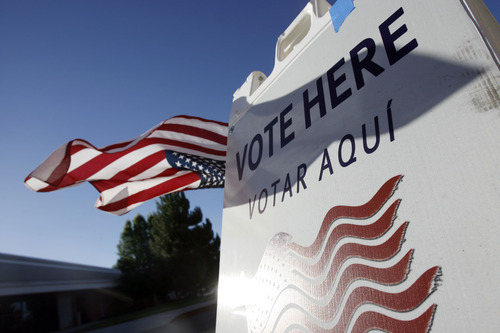This is an archived article that was published on sltrib.com in 2012, and information in the article may be outdated. It is provided only for personal research purposes and may not be reprinted.
Summit County — home of ski paradise Park City — reported 27,230 registered voters on its rolls in 2010. The trouble is the census found only 26,254 adults residing there.
So it had 976 more registered voters than living adults.
Five other Utah counties show similar discrepancies. Grand County reported registered voters that amount to 118 percent of its adult population. In Daggett, it was 105 percent; in Rich, 104 percent; and in Carbon and San Juan, 101 percent.
Truth The Vote, a Texas-based watchdog group, is not amused.
It sent notices to these counties informing them they may be in violation of the National Voting Rights Act, and warned it may file lawsuits to force action unless the counties show progress in fixing the problem. The group sent similar notices to 154 counties in 18 other states with the same problem.
"It's simply unacceptable for any county to have more voters on its rolls than people who are alive and eligible to vote. Failing to maintain accurate voter registration records is a flagrant violation of Section 8 in the National Voter Registration Act," said Catherine Engelbrecht, president of Truth The Vote.
The group said in notices that such situations could subvert elections. It could allow votes by dead or fictional people, or allow some people to vote in more than one location.
The group said it discovered the problem by comparing census population numbers to voter registration totals reported to the U.S. Election Assistance Commission in 2010.
Summit County Clerk Kent Jones says the data may be a bit dated and deceptive, but adds his county has removed thousands of ineligible voters in the past few years.
He said the high voter registration number of 27,230 used by the commission was actually for 2008, not long after he took office, and he said the county now has 24,832 registered voters.
Summit has purged more than 4,000 ineligible names in recent years, Jones said, as the county also adds several hundred new voters each year.
But he said it takes several years to purge names of voters who move but fail to notify the county.
Federal law requires counties to send notices after voters have missed voting in two general elections (on even-numbered years), and then wait for them to miss another election before names can be removed, Jones said.
"We also go through death records on a monthly basis and purge those names," he said. "We are in no danger of being out of compliance with the law."
Keeping voter rolls in order also is a priority in Carbon County, says Alexis Horsley, deputy clerk-auditor.
"We've been working pretty hard to remove names" of those who have moved or died, she said.
"The problem is we are a college town [with the College of Eastern Utah in Price], and the law doesn't allow us to remove students' names until we obtain information that they have registered somewhere else.... They often don't," so the county must wait until they have missed three general elections and not responded to notices to remove names.
The state is working on the issue, acknowledging that under current laws, "It is quite difficult to get voters off the rolls," said Mark Thomas, state elections director for Lt. Gov. Greg Bell.
Utah joined the new Electronic Registration Information Center with seven other states — and hopes that up to 20 states will join by next year — to share information about people who move or register elsewhere.
"So we would send a postcard out saying it appears you are registered in another state or it appears you have a driver license in another state, do you want us to remove your name here?" Thomas said.
The Texas group's efforts targeting outdated voter roles follows a Pew Center on the States report on the issue last year.
The center provided data to Utah indicating that two of every five voter registrations in Utah have significant problems — such as having a duplicate registration elsewhere, being for a dead person or simply having an address that is wrong.
Pew contracted with a company that used a private database developed by requesting voter lists from all states and combining those with death records from the Social Security Administration and the U.S. Postal Service's National Change of Address database.



